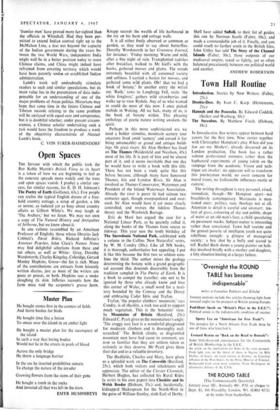Open Spaces
THE fervour with which the public took the Rev Keble Martin's British Flora to its heart is a token of how we are beginning to feel as the concrete spreads more widely and the trees and open spaces vanish. I predict a similar suc- cess, for similar reasons, for E. D. H. Johnson's The Poetry of Earth (Gollancz, 63s.). Few people can realise the typical English dream of a free- hold country cottage, a scrap of garden, a life as serene, as isolated yet as busy 'about country affairs as Gilbert White's. We may laugh at The Archers,' but we listen. We may not own a copy of The Natural History and Antiquities of Selborne, but we know about it.
In one volume (assembled by an American Professor of English), those whose libraries lack Cobbett's Rural Rides, Richard Jefferies's Amateur Poacher, John Clare's Nature Notes may find delightful selections from these and ten others, as well as White: Gray, Dorothy Wordsworth, Charles Kingsley, Coleridge, Gerard Manley Hopkins, Gosse—the list is rich. Many of the contributions are extracts from leisurely written diaries, just as most of the writers are poets or priests, or both. Hopkins sees a snake sloughing its skin. Jefferies recounts how the farm mice raid the carpenter's grease horn. Knapp records the wealth of life harboured in the ivy on his barn and cottage walls.
It is all either finely observed or common or garden, as they used to say about butterflies.
Dorothy Wordsworth in her Grasmere Journal, for instance: 'Friday morning. Warm and mild, after a fine night of rain. Transplanted radishes after breakfast, walked to Mr Gell's with the books, gathered mosses and plants. The woods extremely beautiful with all autumnal variety
and softness. I carried a basket for mosses, and
gathered some wild plants. Oh! that we had a book of botany.' In another entry she writes out 'Ruth,' rows to Loughrigg Fell, visits 'the white foxglove,' gathers wild strawberries and walks up to view Rydale. Any of us who wanted to could do most of this now. I once picked orchids in Woking. All we lack, many of us, is the book of botany within. This pleasing anthology of poetic nature writing awakens the spirit.
Perhaps in this more sophisticated era we need a bolder stimulus, mountain scenery (our ancestors lived amid 'scenery' and cursed it for being untameable) or grand and antique build- ings. Or great rivers. Sir Alan Herbert has lived on The Thames (Weidenfeld and Nicolson, 45s.) most of his life. It is part of him and he almost part of it, and it seems inevitable that one day he would have to write a book with this title. There has not been a study quite like this before because, although many have honoured Thames, Isis and London River, Sir Alan is involved as Thames Conservator, Waterman and President of the Inland Waterways Association. Already the river is purer (it had salmon two centuries ago), though overpopulated and over- used. Sir Alan would have it yet more closely controlled, and revives the tideless Thames theory and the Woolwich Barrage.
Eric de Mare has argued the case for a National Linear Park, as he quaintly called it, along the banks of the Thames from source to tideway. This year sees the tenth birthday of The Snowdonia National Park, celebrated with a volume in the Collins 'New Naturalist' series, by W. M. Condry (30s.). Like all NN books, it is thorough, authoritative but appealing. I put it like this because the first two so seldom com- bine the third. The author mixes the geology determining the botany with a grand geographi- cal account that descends discernibly from the tradition sampled in The Poetry of Earth. It is a book to compel the traveller; one not to be ignored by those who already know and love this corner of Wales, a small word for a terri- tory bounded by the Conway and the Dovey and embracing Cader Idris and Tryfan.
Tryfan, 'the popular climbers' mountain,' says Condry, is of rhyolite, a rock too acid to support much vegetation. This is the botanists' view. hi Mountains of Britain (Batsford, 25s.) Edward C. Pyatt gives us the mountaineer's angle: 'The craggy east face is a wonderful playground for moderate climbers and is thoroughly nail- scratched.' The British climbs, as disgruntled mountain men have had cause to comment, are now so familiar that they are seldom taken as seriously as they deserve. Mr Pyatt gives them their due and us a valuable inventory.
The Hadfields, Charles and Mary, have given us a splendid work on The Cotswolds (Batsford, 25s.), which both visitors and inhabitants will appreciate. The editor of the Chester Chronicle, Herbert Hughes, has collected his Rural Rides (a series in his own paper) into Cheshire and its Welsh Border (Dobson, 35s.) and, incidentally, kidnapped Shakespeare for the North-West in the guise of William Stanley, sixth Earl of Derby.
Shell have added Suffolk to their list of guides, this one by Norman Scarfe (Faber, 18s.), and made a commendable job of it. Finally, and you could reach no farther south in the British Isles, John Uttley has told The Story of the Channel Islands (Faber, 30s.), those outposts of our mediaeval empire, taxed so lightly, yet so often balanced precariously between one political world






























 Previous page
Previous page